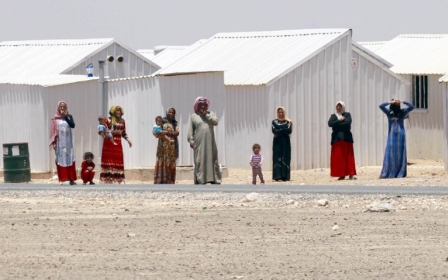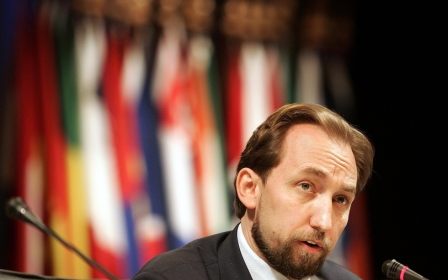Stranded refugees on Jordan’s crossroads
AMMAN, JORDAN - On 15 October, 2012, Mahmoud Murjan’s torture-marked body was dumped in front of his father’s house in Syria. He had been shot in the leg earlier in the day, then yanked into a car and driven away. A Palestinian who had once sought refuge in Jordan from the violence in Syria, Murjan and his wife and two children had been deported by Jordanian authorities just a few weeks before Murjan's death.
For more than two years, Jordan has refused entry to Palestinians from Syria and has even gone so far as to deport Palestinians, including women and children, according to a report, released yesterday by Human Rights Watch, that documented Murjan and others’ cases. It criticised the Jordanian government for its unprecedented efforts to prevent Palestinians fleeing violence in Syria from seeking refuge in Jordan.
At least 14,000 Palestinians from Syria have entered Jordan since the violence in Syria began in 2011. In April 2012, Jordan began denying entry to Palestinians, who nevertheless continued to cross the border illegally, either with false or borrowed documents or by paying someone to smuggle them in. Since the beginning of 2013, security forces have deported over 100 Palestinians to Syria, according to Human Rights Watch.
Jordan’s non-admittance policy became official in January 2013 when Prime Minister Abdullah Ensour told the newspaper Al-Hayat, “Jordan has made a clear and explicit sovereign decision to not allow the crossing to Jordan by our Palestinian brothers who hold Syrian documents,” adding that they should remain in Syria "until the end of the crisis."
"People fleeing Syria, be they Palestinians or non-Palestinians, broadly speaking, are fleeing the same thing," said Chris Gunness, spokesperson for the United Nations Relief and Works Agency (UNRWA), which provides aid to Palestinian refugees in the Arab region. “They're fleeing the same bombs...they should be given the same protection.”
In reality, Palestinians from Syria do not receive the same protection as Syrian nationals, to the detriment of their families, their livelihoods, and, sometimes, such as in the case of Murjan, their lives.
The reason lies in decades-old international agreements on refugees, which exclude Palestinians and create a legal framework that ensures that the official responsibility for protecting them and advocating for their rights now falls, essentially, on no one.
The UNCCP
Many of the problems Palestinian refugees from Syria face in Jordan today stem from several international covenants chartered more than six decades ago, one of which has been all but forgotten.
Created in December 1948, the United Nations Conciliation Commission for Palestine was tasked in part with "facilitat[ing] the repatriation, resettlement and economic and social rehabilitation of the refugees and the payment of compensation" to Palestinian refugees. The following year, UNRWA was established to provide humanitarian assistance to Palestinian refugees.
Thus by the time the all-important Office of the United Nations High Commissioner for Refugees (UNHCR) was established in 1950, the refugee convention adopted the following year, and the first UN convention on statelessness in 1954, the UNCCP and UNRWA, at least from the UN’s perspective, "had already been given all of the authority and the mandate towards both protection and humanitarian assistance for the Palestinians - and only for the Palestinians," explained Susan Akram, a clinical professor of law at Boston University who oversaw a recent report on protecting Syrian refugees.
Because organisations that were supposed to work on behalf of Palestinian refugees were already in place, Arab states “did not want the Palestinians then to fall into a different regime that was focused on resettlement,” Akram added. This objection is one of the reasons the Arab states that host the most Palestinian refugees, Jordan and Lebanon, remain conspicuously absent from the list of signatories to the 1951 Refugee Convention.
“By about the late 1950s, early 1960s, because the UNCCP was unable to achieve what it was required to, the UN kept defunding the agency,” Akram said. “It's defunct de facto, but not de jure.” Nevertheless, "the UNCCP is still the legally mandated UN body that’s supposed to provide protection for Palestinian refugees.”
As a result, although UNHCR is the global body for refugees, Palestinians do not fall under its jurisdiction. Instead, they are “outside of the main legal framework for guaranteeing their rights, to search and find durable solutions, which is the essence of refugee protection.”
Essentially, Palestinians aren’t seen as refugees, Akram said, and so their legal right to protection and non-refoulement - not being returned to a place where their lives or freedoms are threatened - has to derive from other legal sources. “We have no refugee definition in place for Palestinians that relates to non-refoulement,” Akram said.
UNRWA has stepped in to help provide day-to-day needs like food, clothing, shelter, health care, and education, but it cannot advocate on refugees' behalf when they face detainment or deportation or are denied entry.
A history of generosity
"Find me a country anywhere in the world that would allow two million refugees from another country to live there," UNRWA's Chris Gunness is quick to point out. "Broadly speaking, Jordan has been a very generous country toward the Palestinians," its record "exemplary in many ways."
Still, when asked about Jordan's non-admittance policy, he said emphatically, "We disagree completely with their [the Jordanian government's] position on Palestinians coming from Syria. We've made our objections known both publicly and privately."
Some estimates state that half of Jordan's population of 6.3 million is of Palestinian descent. According to 2013 statistics from UNRWA, more than two million Palestinians refugees live in Jordan.
Ziad al-Zoubi, spokesperson for Jordan's Interior Ministry, declined to answer questions about the government's policy of refusing entry to Palestinian refugees from Syria, claiming that the ministry did not have anything to do with the issue of Palestinian refugees.
In the Jordanian government, the ministry is primarily responsible for addressing refugees' needs, and it also has the right to deport non-Jordanians.
The Human Rights Watch’s report also documented cases in which Jordan has stripped citizenship or confiscated documents from Palestinians from Syria that held Jordanian citizenship or identity documents, and denied them entry to Jordan.
"In situations like this, you have groups of Palestinians who are … effectively cut off from the regular assistance regime that’s been set up in these various countries," said Adam Coogle, Middle East researcher for Human Rights Watch.
Coogle added that while Jordan’s non-admittance policy is unprecedented, cases of Palestinians with Jordanian citizenship having that citizenship revoked have been seen before, such as Kuwaitis who fled to Jordan after the Iraqi invasion in 1991.
Palestinians also have been refused entry at the Jordanian border before, in 2006, when in one situation 89 refugees were then led to and kept in a “no-man’s land".
“Jordan is slamming the door in the face of a small, but desperate group of people,” Bill Frelick, HRW's refugee policy director, said at the time. “Jordan should not treat Iraqi-Palestinians fleeing persecution more harshly than other Iraqis fleeing violence, who have generally been allowed to enter Jordan.”
The government "fear[s] a mass influx of Palestinians to Jordan, which they argue would destabilise the country," Coogle said. Government officials have cited concerns about demographic imbalances if the numbers of Palestinians in Jordan increase, and they've also suggested a reluctance to plunge more deeply into the decades-long, unresolved Israeli-Palestinian conflict.
"Jordan is not a place to solve Israel’s problems," Prime Minister Ensour told Al-Hayat. "Receiving those [Palestinian] brothers … would be a prelude to another wave of displacement."
"This is an issue where a very threatened, very vulnerable, population is under threat now," Coogle stressed. "We don't have time to wait for negotiations."
New MEE newsletter: Jerusalem Dispatch
Sign up to get the latest insights and analysis on Israel-Palestine, alongside Turkey Unpacked and other MEE newsletters
Middle East Eye delivers independent and unrivalled coverage and analysis of the Middle East, North Africa and beyond. To learn more about republishing this content and the associated fees, please fill out this form. More about MEE can be found here.




